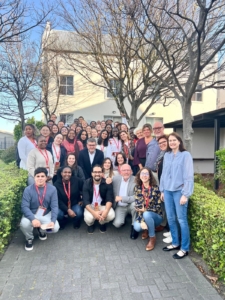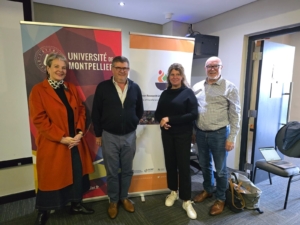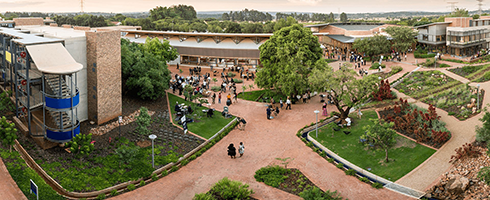You are here: Home1 / Challenge Domains2 / Sustainable Food Systems3 / Feed–Protect–Care Global PhD Collaborative platform hosts third training in ...
Feed–Protect–Care Global PhD Collaborative platform hosts third training in SA
“With just five years left to achieve the 2030 Sustainable Development Goals, the latest Global Sustainable Development Report paints a stark picture. Progress is uneven, regression is real, and without urgent course correction, we face prolonged crises – from poverty and inequality to climate shocks.”
This was the message from Professor Frans Swanepoel, Future Africa Research Chair in Sustainable Food Systems at the University of Pretoria (UP) and UP’s lead for the Feed–Protect–Care Global PhD Collaborative Platform. He was speaking at the opening of the platform’s third training programme, co-hosted by UP and the University of Montpellier (UM), which took place in Cape Town, South Africa, from 8–17 September 2025.
The Feed–Protect–Care Platform, co-developed by UP (South Africa) and UM (France), connects PhD students from across the world. It builds sustainability science capacities, strengthens global research networks, and prepares young researchers to lead transformative change
Building on a global series
The Cape Town training continued a series that began in 2024 with earlier field schools in Montpellier, France, and São Paulo, Brazil, where doctoral students explored global nutrition and food systems challenges.
This third programme brought together a first cohort of 22 PhD students from 13 universities across 16 nationalities. Under the guidance of Prof Swanepoel, Prof Karen Lambert, and a team of experts including Dr Melody Mentz-Coetzee, Dr Elizabeth Mkandawire, Prof Julian May, Prof Patrick Caron, Prof Thais Vieira, and Dr Heide Hackmann, participants addressed key questions such as:
- How should universities and scientific institutions rethink their roles to drive change?
- How do we define, measure, and reward research impact?
- How can food systems science serve as a driver of transformative change?
Symposium and peer learning
On 11 September, the training expanded to include a second cohort of 29 PhD students (21 in-person and 8 online). During a two-day Symposium, Cohort 1 presented three collaborative outcome papers, while Cohort 2 introduced their individual research projects, opening space for peer learning and cross-cohort collaboration.
The remaining days of the programme blended structured dialogue with experiential learning. Highlights included a joint networking session with students from the UKUDLA Summer School, a G20 contextualisation session, and a Food Imbizo focused on African-led food systems transformation. Participants also joined site visits to the Cape Town Market and Steenbras Dam Waterworks, and a cultural and historical tour of the Bo-Kaap.
Going beyond silos
Closing the programme, Prof Swanepoel echoed the call from the 2024 World Science Forum Declaration, urging the global scientific community to intensify efforts to produce trusted knowledge and pragmatic solutions. “Funding, interdisciplinarity, and partnerships are vital – but when pursued in silos, they fall short of transformation,” he said.
This article was adapted from LinkedIn posts by ARUA-SFS and the UM–UP Feed–Protect–Care Global PhD Collaborative Platform.
1st image: Participants at the Feed-Protect-Care Training.
2nd image: from left: Dr Heide Hackmann, Prof Patrick Caron , Prof Prof Thais Vierra and Prof Frans Swanepoel.
Image credit: ARUA-SFS





